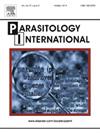Excretory/secretory proteins from Trichinella spiralis adult worms alleviate myocardial dysfunction induced by sepsis in murine models
IF 1.5
4区 医学
Q3 PARASITOLOGY
引用次数: 0
Abstract
Sepsis-induced myocardial dysfunction (SIMD) is a hazardous symptom of sepsis and causes significant death rates. Although previous research has shown that helminthic derivatives alleviate disorders, the immunomodulatory functions of excretory/secretory proteins from Trichinella spiralis adult worms (Ts-AES) in SIMD have not yet been identified. We wanted to see how Ts-AES affects SIMD in this work and explore the potential immune mechanism involved. Murine sepsis model was established by cecal ligation and puncture (CLP) in male BALB/C mice. Following CLP surgery, each mouse received 20 μg Ts-AES intraperitoneally. Results showed that administration of Ts-AES improved the 72-h survival rate of septic mice by up to 40 % compared to untreated mice, who all died within the period. The SIMD was greatly alleviated, characterized by significantly improved left ventricle functions during systole and diastole, reduced biventricular enlargement, and myocardial injury scores. Upon histopathological examination, Ts-AES treatment greatly reduced cardiac inflammation and pathologic injury. The immunomodulatory effect of Ts-AES on protecting SIMD was associated with M2-type macrophage polarization that induces immunomodulatory cytokines and lowers pro-inflammatory cytokines, potentially by blocking the HMGB1/TLR2/NF-κB signal pathway. Our findings in this study demonstrate the potential of Ts-AES as a therapeutic agent for SIMD or other inflammatory disorders.
旋毛虫成虫排泄/分泌蛋白可减轻小鼠脓毒症所致心肌功能障碍
脓毒症引起的心肌功能障碍(SIMD)是脓毒症的一种危险症状,死亡率很高。虽然先前的研究表明蠕虫衍生物可以缓解疾病,但尚未确定来自旋毛虫成虫(Ts-AES)的排泄/分泌蛋白在SIMD中的免疫调节功能。我们希望在这项工作中了解Ts-AES如何影响SIMD,并探索可能涉及的免疫机制。采用盲肠结扎穿刺法(CLP)建立雄性BALB/C小鼠脓毒症模型。CLP术后,每只小鼠腹腔注射20 μg Ts-AES。结果显示,与未经治疗的小鼠相比,给予Ts-AES可使脓毒症小鼠72小时存活率提高40%,在此期间所有小鼠均死亡。SIMD得到了极大的缓解,其特征是左心室收缩和舒张期功能明显改善,双室增大减小,心肌损伤评分降低。经组织病理学检查,Ts-AES治疗可显著减轻心脏炎症和病理损伤。Ts-AES保护SIMD的免疫调节作用与m2型巨噬细胞极化有关,其诱导免疫调节细胞因子,降低促炎细胞因子,可能通过阻断HMGB1/TLR2/NF-κB信号通路。我们在这项研究中的发现证明了Ts-AES作为SIMD或其他炎症性疾病的治疗药物的潜力。
本文章由计算机程序翻译,如有差异,请以英文原文为准。
求助全文
约1分钟内获得全文
求助全文
来源期刊

Parasitology International
医学-寄生虫学
CiteScore
4.00
自引率
10.50%
发文量
140
审稿时长
61 days
期刊介绍:
Parasitology International provides a medium for rapid, carefully reviewed publications in the field of human and animal parasitology. Original papers, rapid communications, and original case reports from all geographical areas and covering all parasitological disciplines, including structure, immunology, cell biology, biochemistry, molecular biology, and systematics, may be submitted. Reviews on recent developments are invited regularly, but suggestions in this respect are welcome. Letters to the Editor commenting on any aspect of the Journal are also welcome.
 求助内容:
求助内容: 应助结果提醒方式:
应助结果提醒方式:


